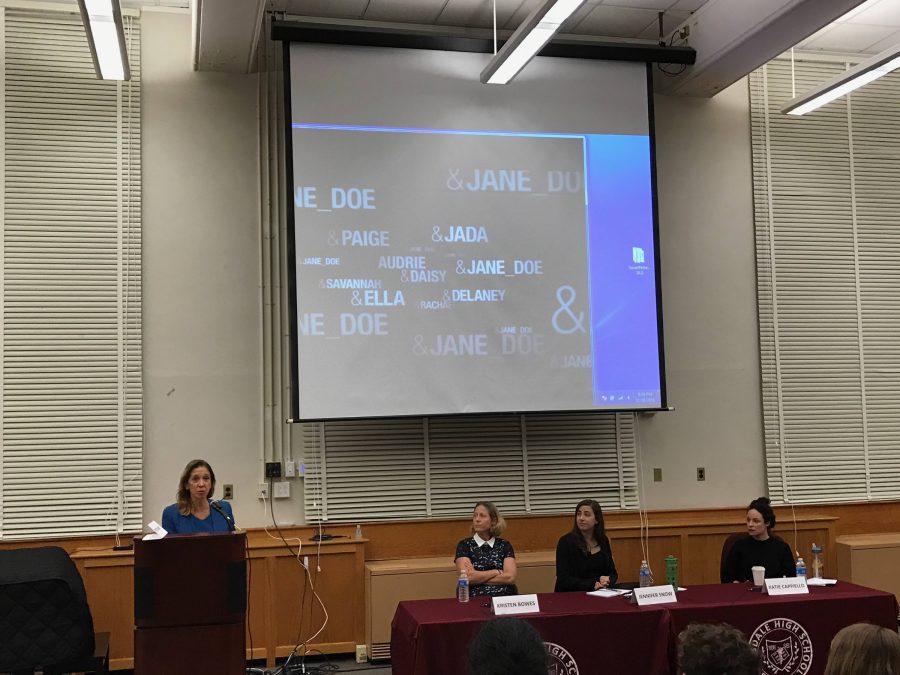Audrie & Daisy Reveals The Reality of Sexual Assault
A screening of Audrie & Daisy was hosted by NYS Assemblywoman Amy Paulin, Scarsdale High School PTA, Scarsdale Edgemont Family Counseling Services, and the Scarsdale Coalition on Family Violence, and showcased the reality of sexual assault at Scarsdale High School’s Little Theater on Nov. 30.
Audrie & Daisy is a documentary that tells the story of Audrie Pott, a high school girl who hanged herself after she was sexually assaulted.
She passed out from drinking at a party, was stripped naked, people drew on her breasts and vagina with a marker, was fingered, and pictures of her naked body were taken and circulated on social media.
It also featured the story of Daisy Cole who was raped after drinking from a tall shot glass, which held five combined shots and was labeled the “b**** cup,” passing out and being left outside in the snow by her attackers.
In both of Pott and Coleman’s cases, their attackers were interviewed, said they viewed their respective situations as jokes that got out of hand and then received little punishment.
Panelists discussed what could be done to prevent similar cases after watching the film including changing the culture so that children do not become sexually active and view pornography at an early age, bystander intervention, and being careful with technology and social media.
“This is starting in middle school, if you think back to when the first time in your life someone sent a nude [it was at an early age,]” author of SLUT: A Play and Guidebook for Combating Sexism and Sexual Violence Katie Cappiello said. “I have sixth-grade students who are being asked to send semi-nudes, and they’re doing it because it’s really hard to say no.”
Board Chair of Students Active to End Rape Jennifer Snow spoke about a double standard for women as oppose to men in terms of being blamed for sexual assault because often times people feel sympathetic towards men who misbehave when drunk but will question women when they do the same.
“Women are asked ‘why did you get so drunk, why did you wear that, why did you do this,” Snow said. “It’s just a very interesting example of how we have such a double standard in the way that men and women are supposed to behave, and how it is women’s responsibly to protect themselves from sexual assault, rather than someone’s responsibility not to sexually assault them.”
Paulin, who was sexually assaulted as a minor, used her own experience as motivation to pass legislation. She is currently working on a bill requiring to educate children in K-12 grade about sexual assault.
Paulin also said that these kinds of events are important because it gives victims a voice and allows them to heal when they might not have had the courage to be open about it before.
“The person who victimized me, I know I wasn’t the only one. I was fourteen years old and he was an adult male. If I had come forward I would have prevented potential victims down the line. Not that that’s the victim’s responsibility, but it would be an outcome of the victim coming forward,” Paulin said. “[Speaking out] is very healing, even as a grown woman that I finally said ‘I was a victim, and it wasn’t my fault’ I finally reckoned with that, and I blamed myself, and I didn’t know I blamed myself for all those years.”
At Pace less than five percent of all crimes, including sexual assault, are reported, according to the Director of the Office of Sexual Assault Prevention and Education Mary Breen.
Confidential resources for those affected by sexual assault include the Office of Sexual Assault Prevention & Education and Pace F.I.R.E. Peer Educators, the Counseling Center, the Center for Spiritual Development, and University Health Care.
Your donation supports independent, student-run journalism at Pace University. Support the Pace Chronicle to help cover publishing costs.

